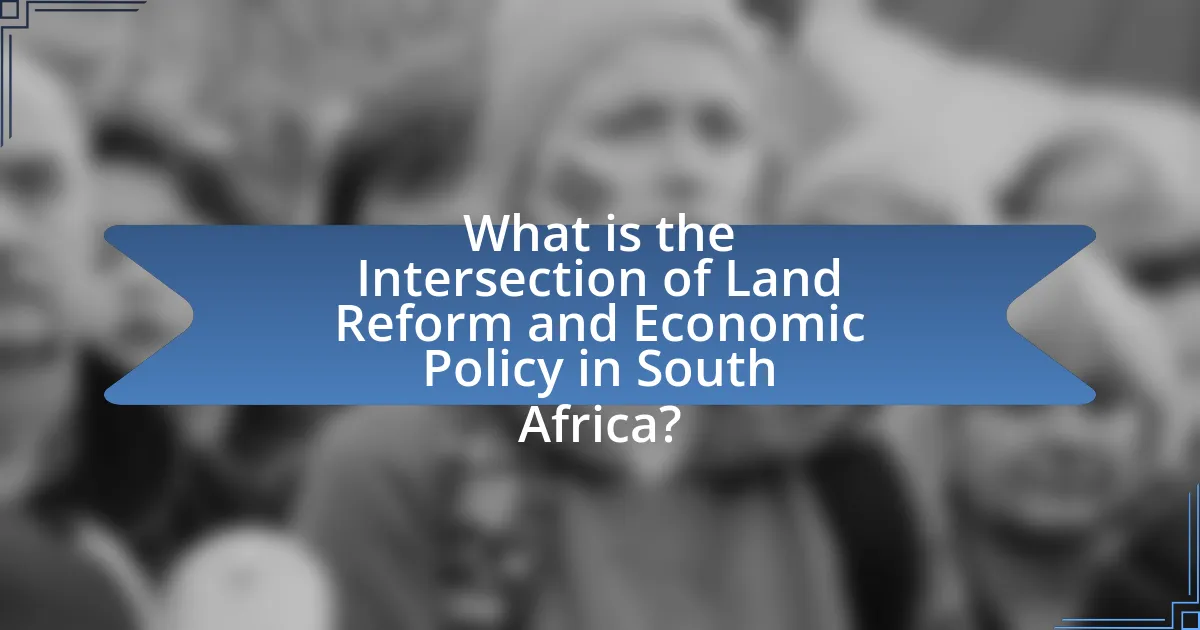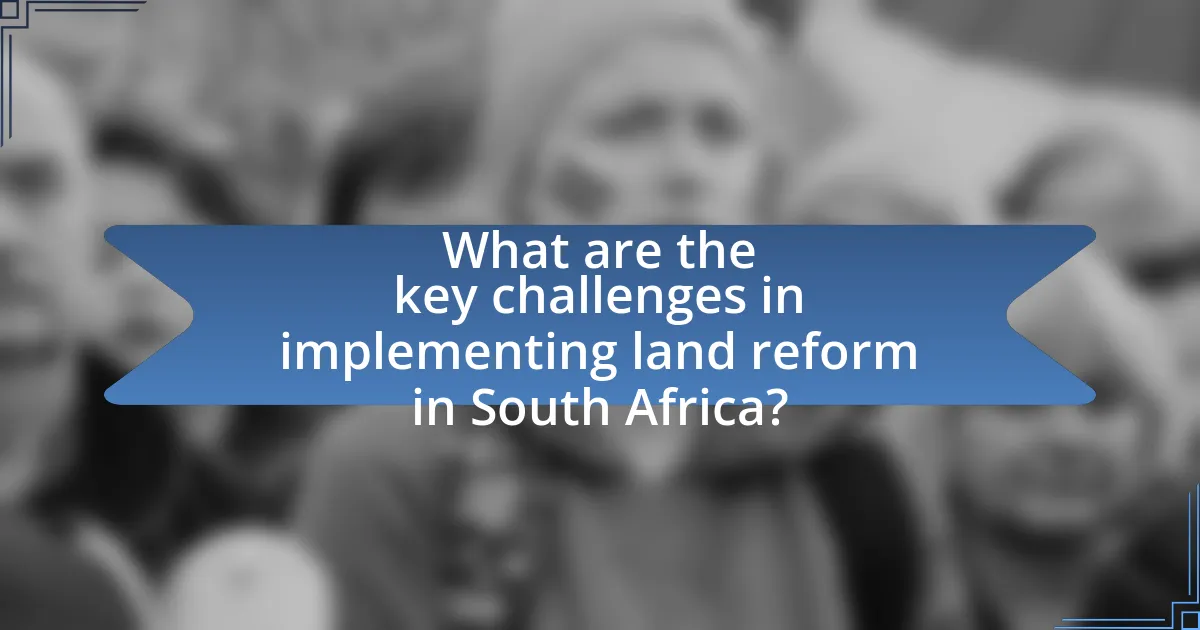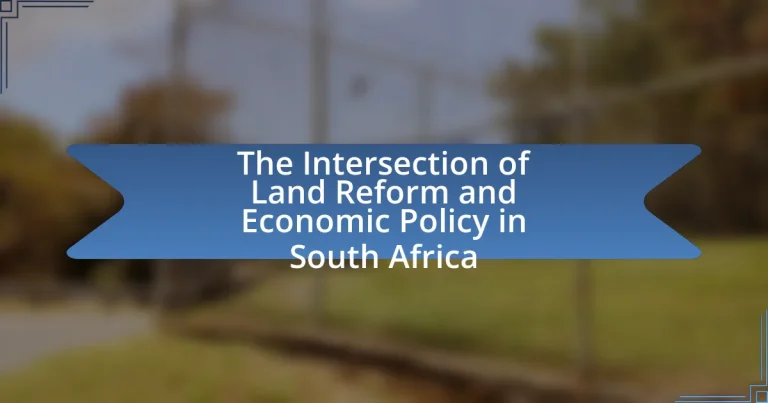The article examines the intersection of land reform and economic policy in South Africa, highlighting the government’s efforts to rectify historical injustices in land ownership while fostering economic growth. It discusses the significance of land reform for achieving economic equity, social justice, and agricultural productivity, as well as the historical context that shapes current policies. Key challenges such as political resistance, economic viability, and social tensions are analyzed, alongside the impact of land ownership on economic empowerment and poverty alleviation. The article also explores successful global land reform models and practical strategies for enhancing land reform initiatives in South Africa.

What is the Intersection of Land Reform and Economic Policy in South Africa?
The intersection of land reform and economic policy in South Africa is characterized by the government’s efforts to address historical injustices related to land ownership while promoting economic growth. Land reform aims to redistribute land to previously disadvantaged communities, which is essential for achieving economic equity and social justice. According to the South African Constitution, land reform is a key component of the broader economic policy framework aimed at redressing the imbalances created by apartheid. The 2018 amendment to the Constitution, which allows for expropriation of land without compensation, reflects the government’s commitment to accelerate land reform as a means to stimulate economic development and improve livelihoods for marginalized populations. This approach is supported by various studies, including the “Land Reform and Economic Development in South Africa” report by the World Bank, which highlights the potential for land reform to enhance agricultural productivity and contribute to overall economic growth.
How do land reform and economic policy interact in South Africa?
Land reform and economic policy in South Africa interact primarily through the redistribution of land to address historical injustices and promote economic equity. The South African government has implemented policies aimed at redistributing land to previously disadvantaged communities, which is intended to enhance economic participation and alleviate poverty. For instance, the 1994 Land Reform Programme aimed to transfer 30% of agricultural land to black South Africans by 2014, although only about 10% was achieved by that time. This interaction is crucial as land ownership is linked to economic opportunities, and effective land reform can stimulate agricultural productivity and rural development, thereby contributing to overall economic growth.
What historical context shapes the current land reform policies?
Current land reform policies in South Africa are shaped by the historical context of colonialism and apartheid, which established systemic land dispossession and racial segregation. The 1913 Natives Land Act, which restricted black South Africans to only 7% of the land, laid the groundwork for ongoing inequalities. Following the end of apartheid in 1994, the government initiated land reform to address these injustices, aiming to redistribute land to previously marginalized communities. The 1997 White Paper on Land Reform emphasized restitution, redistribution, and tenure reform as key components. These historical injustices and policy frameworks continue to influence contemporary debates and strategies surrounding land reform in South Africa.
How have economic policies influenced land ownership patterns?
Economic policies have significantly influenced land ownership patterns in South Africa by shaping access to land and redistributing property rights. For instance, the implementation of land reform policies aimed at addressing historical injustices has led to a shift in ownership from predominantly white landowners to previously marginalized communities. According to the South African government’s 2019 report, over 4 million hectares of land have been redistributed since 1994, reflecting the impact of policies designed to rectify past inequities. Additionally, economic policies that promote agricultural development and investment have further altered land ownership dynamics, encouraging new entrants into the agricultural sector and diversifying land use.
Why is land reform significant for economic development in South Africa?
Land reform is significant for economic development in South Africa because it aims to address historical injustices and promote equitable access to land, which is essential for agricultural productivity and economic growth. By redistributing land to previously disadvantaged communities, land reform can enhance food security, stimulate rural development, and create job opportunities. For instance, the South African government’s land reform policies, such as the Restitution of Land Rights Act of 1994, seek to restore land to those dispossessed during apartheid, thereby fostering social stability and economic participation. Studies indicate that successful land reform can lead to increased agricultural output, as evidenced by the rise in productivity in areas where land has been redistributed effectively.
What role does land ownership play in economic empowerment?
Land ownership is a critical factor in economic empowerment as it provides individuals and communities with the ability to generate income, secure livelihoods, and build wealth. In South Africa, land ownership enables access to resources such as agriculture, which is vital for food security and economic stability. According to the World Bank, secure land tenure can increase agricultural productivity by up to 20%, thereby enhancing economic opportunities for landowners. Furthermore, land ownership allows individuals to leverage their property for credit, facilitating investments in businesses and education, which are essential for long-term economic growth.
How does land reform impact agricultural productivity?
Land reform positively impacts agricultural productivity by redistributing land to previously marginalized farmers, which enhances their access to resources and improves their economic conditions. Studies indicate that when land is redistributed, productivity can increase due to better land management practices and increased investment in agricultural inputs. For example, research conducted by the Food and Agriculture Organization shows that countries implementing land reform have experienced productivity gains of up to 30% in certain regions. This increase is attributed to the empowerment of smallholder farmers who are more likely to adopt sustainable practices and innovate in their farming techniques.

What are the key challenges in implementing land reform in South Africa?
The key challenges in implementing land reform in South Africa include political resistance, economic viability, and social tensions. Political resistance arises from differing views among stakeholders, including government officials, landowners, and communities, which complicates consensus on land redistribution policies. Economic viability is challenged by concerns over the agricultural productivity and sustainability of redistributed land, as many beneficiaries lack the necessary resources and skills. Social tensions are exacerbated by historical grievances related to land dispossession, leading to conflicts between communities and landowners. These challenges hinder the effective execution of land reform initiatives aimed at addressing historical injustices and promoting equitable land access.
What obstacles hinder effective land redistribution?
Ineffective land redistribution in South Africa is primarily hindered by legal complexities, political resistance, and economic constraints. Legal complexities arise from existing property rights and land tenure systems that protect current landowners, making it difficult to implement redistribution policies. Political resistance is evident from various stakeholders, including landowners and political parties, who oppose changes that threaten their interests. Economic constraints include limited financial resources for the government to compensate landowners and invest in infrastructure for redistributed land, which undermines the viability of new landholders. These obstacles collectively impede the progress of land reform initiatives aimed at addressing historical injustices and promoting equitable land access.
How do political factors affect land reform initiatives?
Political factors significantly influence land reform initiatives by shaping the legal framework, policy priorities, and implementation strategies. In South Africa, the political landscape, characterized by the ruling party’s commitment to addressing historical injustices, directly impacts land redistribution efforts. For instance, the African National Congress (ANC) has prioritized land reform as a means to rectify past inequalities, leading to policies aimed at redistributing land to previously disadvantaged communities. However, political instability, public sentiment, and resistance from landowners can hinder these initiatives. The 2018 parliamentary resolution to amend the Constitution for land expropriation without compensation exemplifies how political decisions can accelerate or impede land reform processes, reflecting the complex interplay between governance, public policy, and social equity.
What economic implications arise from land reform challenges?
Land reform challenges in South Africa lead to significant economic implications, including decreased agricultural productivity and increased social unrest. The inability to effectively redistribute land often results in a lack of investment in agriculture, as landowners may be uncertain about their property rights. For instance, a study by the World Bank indicated that land tenure insecurity can reduce agricultural output by up to 30%. Additionally, unresolved land claims can exacerbate tensions among communities, leading to protests and instability, which further deter foreign investment. These factors collectively hinder economic growth and exacerbate inequality, illustrating the critical link between land reform and economic policy.
How does public perception influence land reform policies?
Public perception significantly influences land reform policies by shaping political agendas and legislative priorities. When the public views land reform as a critical issue, policymakers are more likely to prioritize it in their agendas to gain electoral support. For instance, in South Africa, widespread public concern over land inequality has led to increased pressure on the government to implement reforms, as evidenced by the 2018 parliamentary motion to amend the Constitution to allow for land expropriation without compensation. This public sentiment is often reflected in opinion polls and social movements, which can mobilize political action and influence the direction of policy development.
What are the common misconceptions about land reform?
Common misconceptions about land reform include the belief that it solely involves the redistribution of land from white landowners to black individuals, ignoring the complexities of land tenure systems and economic implications. Many assume that land reform will automatically lead to increased agricultural productivity, while studies, such as those by the World Bank, indicate that successful land reform requires accompanying support measures like access to credit and training. Additionally, there is a misconception that land reform is a quick fix for historical injustices, whereas it often requires long-term planning and investment to be effective.
How can public engagement improve land reform outcomes?
Public engagement can significantly improve land reform outcomes by fostering transparency, inclusivity, and accountability in the decision-making process. When communities actively participate in discussions about land reform, they can express their needs and priorities, leading to more tailored and effective policies. Research indicates that inclusive land reform processes, such as those involving stakeholder consultations, can enhance the legitimacy and acceptance of reforms, ultimately resulting in better implementation and sustainability. For instance, the South African land reform process has shown that public participation can lead to more equitable distribution of land and improved economic opportunities for marginalized groups, as evidenced by various case studies highlighting successful community-led initiatives.

What are the potential benefits of successful land reform in South Africa?
Successful land reform in South Africa can lead to increased agricultural productivity and economic growth. By redistributing land to previously disadvantaged communities, land reform can empower these communities, enhance food security, and stimulate local economies. Historical data indicates that equitable land distribution can improve livelihoods; for instance, studies show that smallholder farmers can be more productive than large-scale commercial farms under certain conditions. Furthermore, successful land reform can reduce social inequalities and foster social cohesion, as it addresses historical injustices related to land ownership.
How can land reform contribute to social equity?
Land reform can contribute to social equity by redistributing land ownership to historically marginalized communities, thereby addressing inequalities rooted in colonial and apartheid policies. This redistribution allows for increased access to resources, enabling these communities to engage in agricultural production, secure livelihoods, and improve their economic status. For instance, the South African land reform program aims to transfer land to black South Africans, who previously faced systemic exclusion from land ownership. According to the South African government, as of 2021, approximately 4.5 million hectares of land have been redistributed, which has the potential to uplift communities and reduce poverty levels. By promoting equitable land access, land reform fosters social justice and economic empowerment, ultimately contributing to a more equitable society.
What impact does land reform have on poverty alleviation?
Land reform significantly impacts poverty alleviation by redistributing land to marginalized communities, thereby enhancing their economic opportunities. Studies indicate that land ownership increases agricultural productivity and income levels among previously landless individuals. For instance, research by the World Bank shows that land reform can lead to a 20-30% increase in household income for beneficiaries in developing countries. Furthermore, access to land enables families to secure food, improve living conditions, and invest in education, which collectively contributes to breaking the cycle of poverty.
How does land reform promote economic diversification?
Land reform promotes economic diversification by redistributing land to previously marginalized communities, enabling them to engage in various agricultural and non-agricultural activities. This redistribution allows for the cultivation of diverse crops and the establishment of small businesses, which can lead to increased local production and job creation. For instance, studies have shown that land reform in South Africa has led to the emergence of new agricultural enterprises, contributing to a more varied economic landscape. By empowering individuals with land ownership, land reform fosters innovation and entrepreneurship, further enhancing economic resilience and reducing dependency on a single economic sector.
What lessons can be learned from other countries’ land reform experiences?
Countries’ land reform experiences reveal several key lessons for South Africa. Firstly, successful land reform requires clear legal frameworks and property rights, as seen in countries like Brazil, where defined land tenure has facilitated agricultural productivity. Secondly, inclusive participation of local communities in the reform process, exemplified by land reforms in Zimbabwe, can enhance legitimacy and reduce conflict. Thirdly, the importance of adequate financial support and resources for beneficiaries is highlighted by experiences in Vietnam, where government investment in infrastructure and training has led to improved outcomes. Lastly, the need for ongoing monitoring and evaluation, as practiced in land reforms in South Korea, ensures that policies adapt to changing circumstances and achieve intended goals. These lessons underscore the necessity of a comprehensive approach to land reform that considers legal, social, and economic dimensions.
What successful land reform models exist globally?
Successful land reform models globally include the land redistribution program in Brazil, which has effectively reduced land inequality through the establishment of agrarian reform settlements, benefiting over 1.5 million families since its inception in the 1990s. Another example is the land reform in South Korea, initiated in the 1950s, which transformed land ownership by redistributing land from landlords to tenant farmers, significantly increasing agricultural productivity and rural incomes. Additionally, the land reform in Zimbabwe, despite its controversies, aimed to address historical injustices and has led to increased land access for previously marginalized communities. These models demonstrate various approaches to land reform that have had significant impacts on social equity and economic development.
How can South Africa adapt these models to its context?
South Africa can adapt land reform and economic policy models by integrating community-based approaches that prioritize local needs and historical context. This adaptation involves engaging with stakeholders, including landowners, farmers, and communities, to create policies that reflect the unique socio-economic landscape of South Africa. For instance, the government can implement land redistribution strategies that consider the diverse agricultural practices and cultural significance of land among different communities. Evidence from successful land reform initiatives in countries like Brazil shows that inclusive participation leads to more sustainable outcomes, which South Africa can emulate to ensure that its policies are effective and equitable.
What practical steps can be taken to enhance land reform and economic policy integration?
To enhance land reform and economic policy integration in South Africa, the government should implement a comprehensive land audit to assess land ownership and usage patterns. This audit would provide critical data to inform equitable land redistribution policies, ensuring that land is allocated to those who need it most, thereby addressing historical injustices.
Additionally, establishing clear legal frameworks that facilitate secure land tenure for beneficiaries can encourage investment in agriculture and related sectors. For instance, the introduction of long-term leases can provide security for farmers, enabling them to access credit and improve productivity.
Furthermore, integrating land reform initiatives with economic development programs can create synergies that promote sustainable growth. For example, linking land reform with skills training and access to markets can empower new landowners and enhance their economic viability.
Evidence from various studies indicates that countries with successful land reform programs often see improved agricultural output and economic stability, underscoring the importance of these practical steps in South Africa’s context.
What strategies can policymakers adopt for effective land reform?
Policymakers can adopt strategies such as inclusive stakeholder engagement, clear legal frameworks, and targeted financial support for effective land reform. Inclusive stakeholder engagement ensures that the voices of affected communities are heard, which can lead to more equitable and sustainable outcomes. Clear legal frameworks provide the necessary guidelines for land redistribution and tenure security, reducing conflicts and uncertainties. Targeted financial support, including grants and low-interest loans, can facilitate access to land for marginalized groups, enhancing their economic viability. Evidence from successful land reform initiatives in countries like Brazil and Rwanda demonstrates that these strategies can lead to improved agricultural productivity and social stability.
How can stakeholders collaborate to support land reform initiatives?
Stakeholders can collaborate to support land reform initiatives by forming partnerships that leverage their unique resources and expertise. For instance, government agencies can work with non-governmental organizations (NGOs) to create policies that address land redistribution while ensuring sustainable land use practices. Additionally, private sector involvement can provide financial resources and technical support, enhancing the effectiveness of land reform programs. Evidence from South Africa’s land reform history shows that successful initiatives often involve multi-stakeholder engagement, such as the collaboration between the Department of Rural Development and Land Reform and various community organizations, which has led to improved outcomes in land access and agricultural productivity.


